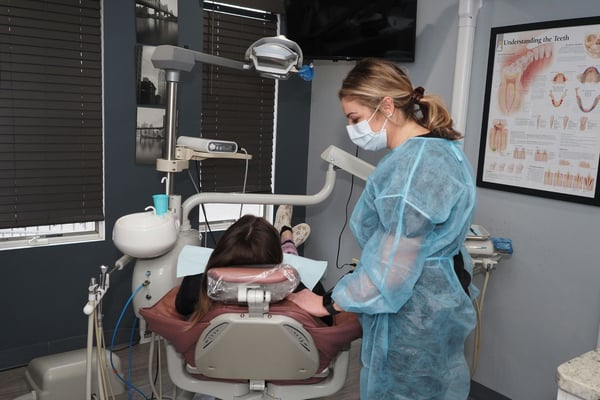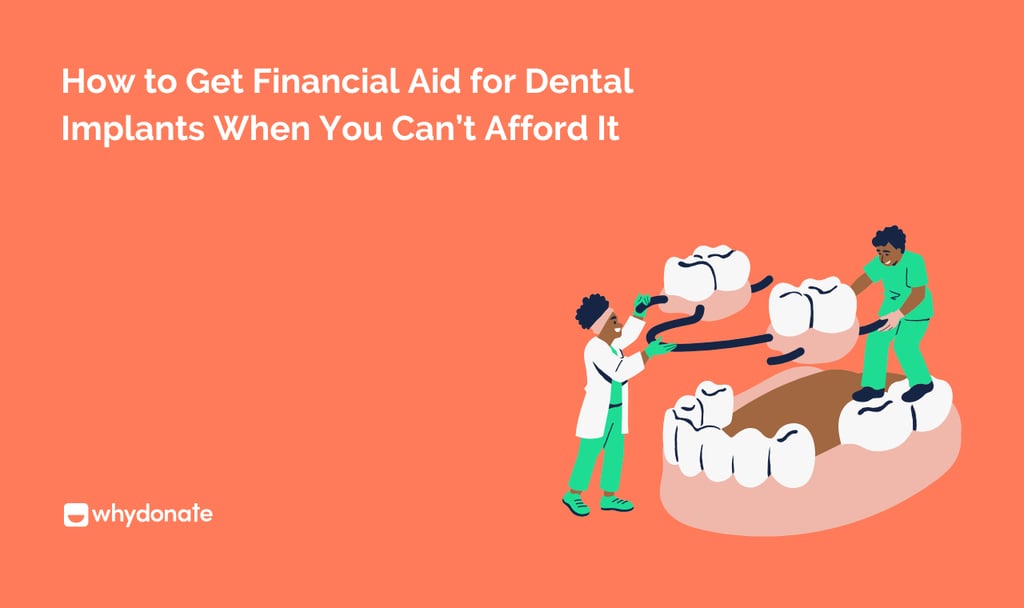If you’ve been told dental implants could change your life, yet your finances have other ideas, you’re not alone. Many adults, especially those without insurance, seniors on a fixed income, and anyone whose budget is already stretched, are affected.
Let’s shed some light on dental implant financial aid, which is not just a hopeful phrase, but a real set of solutions ready for those willing to dig just a bit deeper and ask the right questions. Let’s get started!
- Share Your Story and Raise Funds for Your Dental Treatment for FREE!
Table of Contents
The High Cost of Dental Implants
It’s easy to focus on what you pay upfront, but the rewards of dental implants often arrive quietly over the years. They’re more than just a picture-perfect smile. Implants preserve bone, steady your bite, make speech clearer, and save you from future dental problems and costs. They’re built to last when other options fall short, meaning your money goes further in the long run.
What Makes Implants Expensive?
Here’s what stacks up the bill:
- The implant post is made from titanium, a material that fuses with your jaw.
- The abutment acts as the link between the post and the crown.
- The custom-made crown is shaped and shaded to match you.
- Bone grafts or other supportive procedures, which some patients need for the best results.
- Each expert who touches your case, from surgeon to lab tech, adds value and cost.
Average Pricing for Single and Full-Mouth Implants
Expect to see single implants quoted at $3,000–$5,000, while a full set can run $50,000 or more. These costs shift with geography, the complexity of your dental needs, and the skill of your provider.

Types of Dental Implants Financial Aid
Finding dental implant assistance means knowing where to look and looking with intention.
1. Dental Grants
Organizations like Cosmetic Dentistry Grants and Give Back a Smile offer grant programs. They spotlight people who face both financial barriers and specific dental needs, sometimes paying for a significant part of the process. Applying requires honesty, persistence, and paperwork, but don’t let that stop you.
2. Nonprofit Dental Implant Assistance
Ever heard of Dental Lifeline Network or Missions of Mercy? These groups connect people with pro bono or strongly discounted care, focusing on those most vulnerable. Their reach extends nationally and locally. Look up events and eligibility, and ask your primary care physician about referrals.
3. Public Health Clinics
Across the country, HRSA-funded health centers and local clinics often work on sliding scales. To track down these resources, search phrases like “federally qualified health centers [your city/state]” online or consult your nearest community health hub. These clinics offer more than cleanings. They’re a pivotal link to affordable dental surgery.
Dental Insurance and Discount Plans
When searching for assistance with dental implants, insurance is rarely a hero, think sidekick, not star.
What Insurance Covers
Most dental plans offer little toward implants. Medical policies only step up if your case ties directly to health events, like accidents or cancer. Always ask for specifics, read your plan in full, and don’t rely solely on coverage.
Dental Discount Cards
Some opt for Carefree Dental and similar cards, membership programs where you sign up and get access to negotiated lower prices at network dentists. These aren’t insurance but are another way to trim costs.
Financing and Payment Plans
Here are some other options for financial assistance for dental implants available:
1. Third-Party Providers
Providers like CareCredit and LendingClub specialize in health financing, and they can help convert your lump sum into smaller, more manageable payments. Check on interest rates and approval criteria before making a choice.
2. In-House Payment Options
Your own dental office might surprise you. Many now offer in-house plans with little or no interest, and some welcome cash payments with a discount. The magic is in starting the conversation; ask about payment flexibility directly.
3. HSAs and FSAs
If you’re lucky enough to have a Health Savings Account or Flexible Spending Account, dip into those pre-tax dollars for dental implants; it’s a rare bright spot in the cost equation.

Crowdfunding: How to Get Help With Dental Implants
Sometimes, the boldest path is to ask your community for direct help. Crowdfunding plays a crucial role in helping those in need. By following a few simple steps, your fundraiser can reach the heights you never anticipated.
WhyDonate is a bridge between donors and fundraisers. It allows fundraisers to start their campaigns without spending any money and start raising money with a few clicks. With a 0% platform fee and an extensive donor network, WhyDonate fulfils dreams.
Starting a Dental Fundraiser
WhyDonate has made it secure and simple. Share your story with simple words, set a specific fundraising goal, and circulate it widely. People pay attention to something real. Hence, your experience can elicit support.
Dental fundraising is increasingly used by individuals seeking financial help for implants, restorative procedures, and long-term oral health care.
Tips for Crowdfunding Success
Here are some simple tips to achieve crowdfunding success:
- Use catchy photos
- Set a realistic goal
- Post regular updates
- Specify where the money will go
- Spread the word through community groups, social networks, and local organizations
- Don’t be shy, and keep your supporters in the loop
Want to Fulfill Your Financial Obligations? Start Your Fundraising Campaign & Get Your Dental Implants Today!
Alternatives to Implants If You Still Can’t Afford Them
If every dollar still feels too far away, consider other reliable paths for dental implants financial assistance, such as:
1. Dentures and Bridges
These classic solutions aren’t as permanent as implants, but they restore function and confidence for far less money. Trade-offs exist in comfort, durability, and appearance, but they often buy you time to save for implants.
2. Low-Cost Dental Schools
Clinics working within dental schools provide treatment at discounted rates, under the direct supervision of professionals. It really is proper care for a small fraction of what private clinics would charge.
3. Managed Care Dental Plans (DMOs/DHMOs)
Plans with defined co-pays and limited provider choice can help reduce the costs of everyday dental care, allowing you to save more financially for implant work.
Wrapping Up: Turning Plans Into Smiles
In the long run, dental implant financial aid could take time and effort, considering all options for grants, charities, insurance, discount plans, financing, and crowd generosity. Stay in the loop, be creative, and keep going. Smiles with dental implants may just be closer than you think.
Seeking Financial Aid For Dental Implants? Begin Your Campaign Here!

















